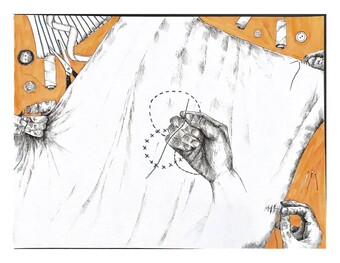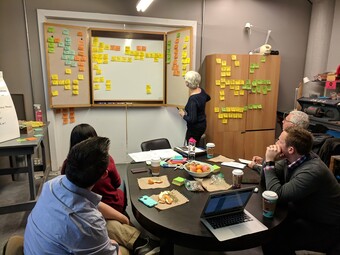Drinking from a Firehose
Trust and The High Dive—Part 4
Sometimes, the best way to study a theory or philosophy is to implement it and learn from the results. This twelve-part series is the year-long account of one young artist’s efforts to start a new theatre company and put into action what he has learned and is learning from the HowlRound and #newplay community.
I have trust issues. This is an important realization for me, especially when I’m managing artistic and organizational development. So I’ve decided to dedicate this month’s blog to process my thoughts about how trust factors into my development of This Is Water Theatre.
I have long maintained that the best directors are also the best teachers. This is because good teachers are, in essence, translators. They take a particular set of information, adapt the way it is delivered so that it can be understood by an individual or group, and respond to feedback from the individual or group by adjusting how they deliver that information. However, most directors are dealing with adults, many of whom are capable human beings with well-developed skill-sets. These skill-sets may or may not have developed in the same way that the director has developed his/hers, but that doesn’t mean that they don’t know what they’re doing.
Sometimes I forget that.
As I’ve been moving through the process of selecting our season (which looks as though it will be made up entirely of first or second production new work), this is something I have tried to be very purposeful in considering. What aspects of each potential script must/can/should I entrust to someone else? How involved in x, y, or z will I need to be? What are the areas I know it will be harder for me to trust someone else?
Paying the price, both in terms of money and trust, is something that I have to come to terms with if I am going to prioritize the reputation of the company.
For a brand new company that is dedicated to compensating artists, but is also working with a small budget, the tasks we have to accomplish have that additional financial component to be considered. For example, I will likely be doing most of our sound design because I have experience and know what I want…and it saves us money. It would, however, be somewhat foolish of me (and hurt our eventual creation) were I to try and take on aspects of design where I am less experienced, such as costuming. Paying the price, both in terms of money and trust, is something that I have to come to terms with if I am going to prioritize the reputation of the company.
A significant portion of the standard operating procedures I am trying to establish in establishing This Is Water Theatre are derived from the negative production experiences I have had in the past. I’ve been burned before, and I don’t want to be burned again. Some of these experience include things like directors promising things they can’t deliver, expectations being implied but never stated, designers and actors disappearing without warning, differences in methodology that nobody bothered to talk about beforehand, and safety being sacrificed for expediency and the bottom line.
So I knew from the very beginning that transparency would be essential, starting with our third stage of auditions and the final stage of our script selection process: we need conversations. If at all possible, I never want to return to a casting model where I don’t get to have a one-on-one conversation with an actor before I hire him or her. Nor do I want to agree to work with a playwright or designer or stage manager I have never met or spoken with. This is not only because I want to make sure that they are people I want to work with, but because I want to make sure that they want to work with me as well! Knowing the thoughts, aspirations, and expectations of the people you work with before you agree to work with them is so important, yet it is something I have rarely been asked as an actor or designer before being hired.
I am also endeavoring to stop making promises unless I can keep them. If I agree to pay an actor, I will have the money before that agreement goes into effect and they will get paid if they do what they’re supposed to, regardless of what happens to the production. Likewise, if I say we’re going to produce a playwright’s work, we’re not going to start rehearsals (and thus a production) until I am certain I can pay for it, even if I don’t have the money in hand (or bank account).
This is just the tip of the trust-building iceberg, and will continue to occupy my thoughts as I progress in building this season. As always, I’d love to hear any thoughts, advice, and/or conversation from the community here on HowlRound. See you next month!
P.S. You can check out our inaugural season line-up here.
















Comments
The article is just the start of the conversation—we want to know what you think about this subject, too! HowlRound is a space for knowledge-sharing, and we welcome spirited, thoughtful, and on-topic dialogue. Find our full comments policy here